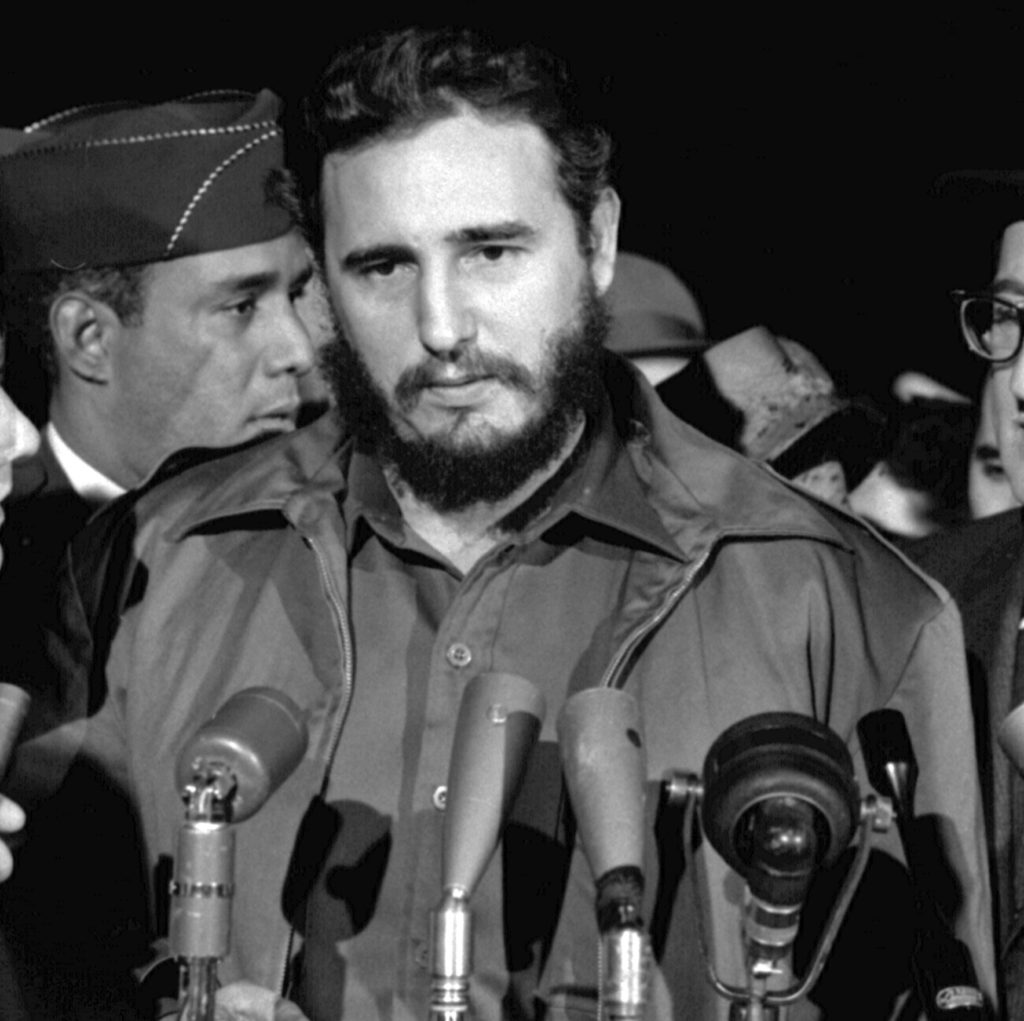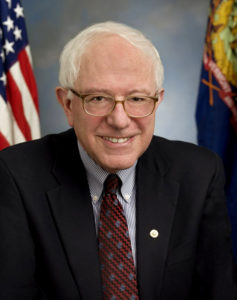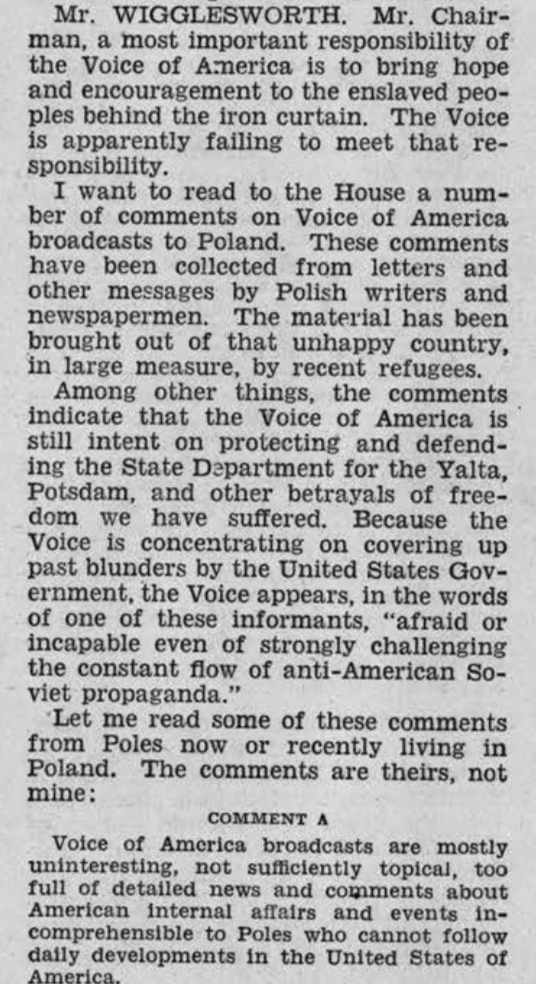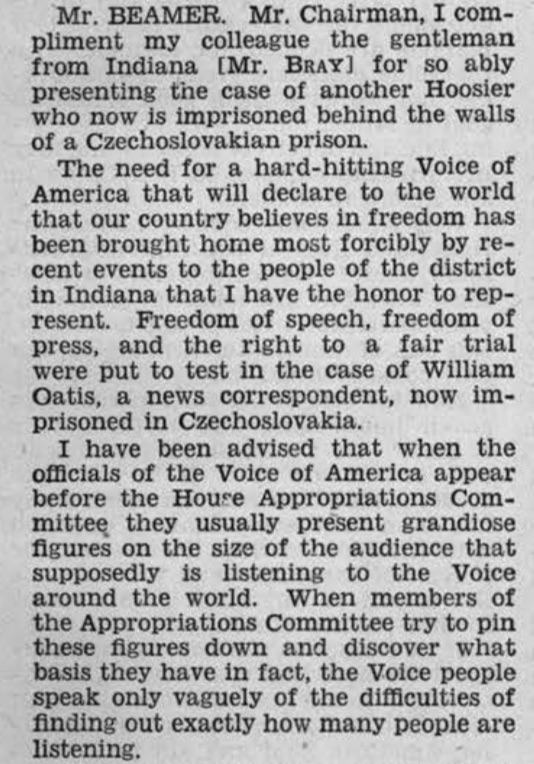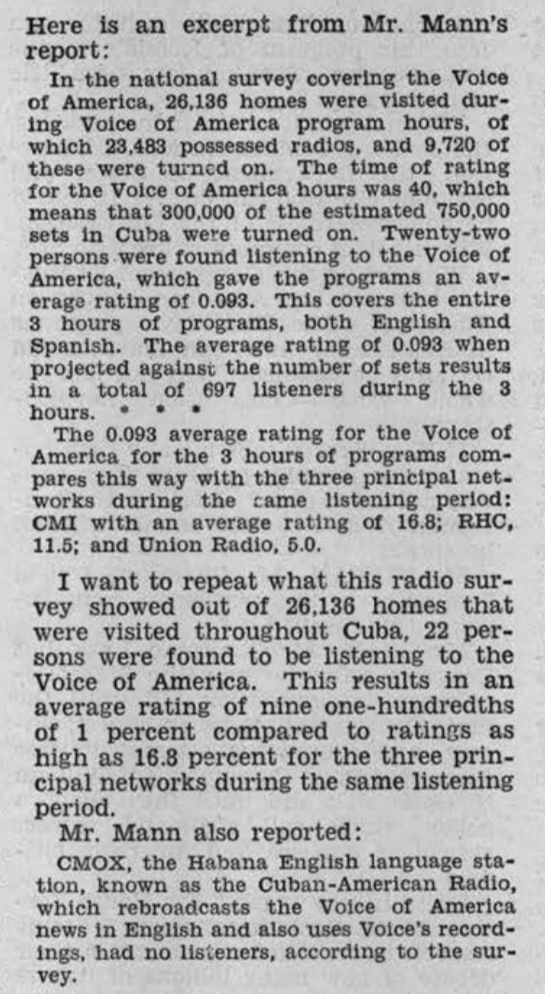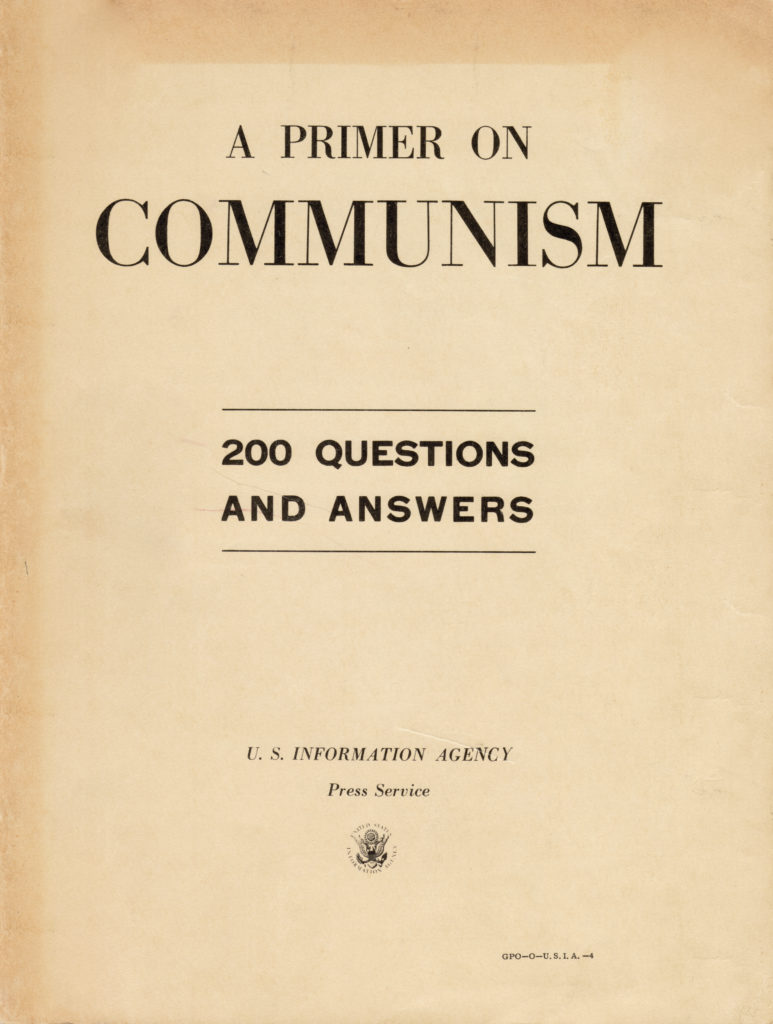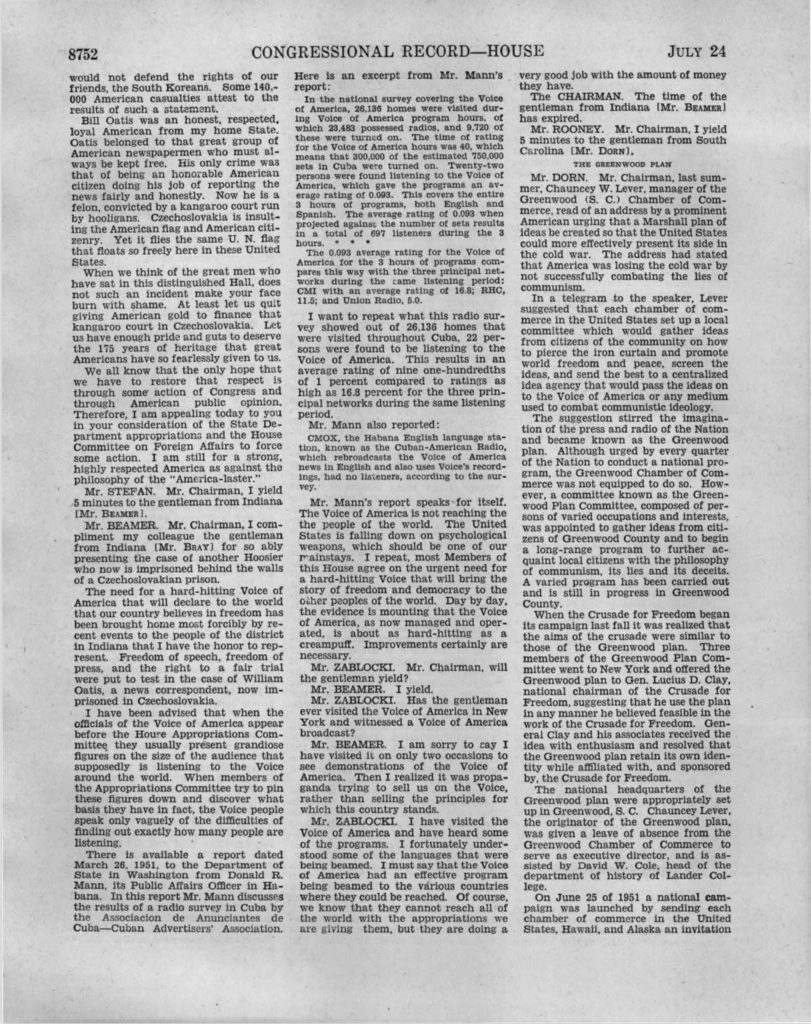Voice of America had no audience in pre-Castro Cuba and initially supported Soviet socialism in Eastern Europe
By Ted Lipien
As reported by CNN and other media, Senator Bernie Sanders said on CBS’ “60 Minutes” in an interview that aired on February 23, 2020 that “It’s unfair to simply say everything is bad” with the way Fidel Castro ruled Cuba.
SENATOR BERNIE SANDERS: “When Fidel Castro came into office, you know what he did? He had a massive literacy program. Is that a bad thing? Even though Fidel Castro did it?”
When host Anderson Cooper pointed to the notable number of dissidents imprisoned in Cuba, Sanders responded, “That’s right. And we condemn that.”
Communists have always placed a strong emphasis on education as a tool of propaganda aimed at children and young adults. Whenever communists managed to gain power, they quickly arrested or murdered their political opponents, abolished free media, jammed foreign broadcasts critical of their rule, and prevented most of their citizens from traveling to Western countries. Universal free basic education is not a unique achievement of communist or socialist regimes. Many formerly underdeveloped countries which remained or became democratic have eliminated illiteracy without any repressive measures. No communist or socialist country offers free university-level education to everyone. Only to those who meet certain educational requirements and those whom communist or Marxist-socialist regimes consider being loyal supporters of the political system.
Introducing Soviet-style state socialism in a country like Cuba also carried a heavy economic price for generations of Cubans, in addition to restricting their human rights. A contemporary Cuban joke explains how socialism has worked for most Cubans who have not been able to escape from the island.
The Cuban Revolution has had three main successes: sports, race relations and medicine.
It has also had three conspicuous failures: breakfast, lunch and dinner.[ref]I want to thank Stephen W. Browne for sharing this joke on social media.[/ref]
Very few Americans know that from 1942 to about 1951, the taxpayer-funded and U.S. government-run Voice of America (VOA) was repeatedly criticized in the U.S. Congress by both Republicans and Democrats for promoting abroad Soviet communist propaganda and Soviet-style socialism.
Joseph Stalin’s Russia was successful in getting President Franklin D. Roosevelt’s administration to support Soviet control of East-Central Europe and the establishment of “socialist” regimes in the region after World War II. The first chief news writer and editor of Voice of America radio broadcasts to Europe in 1943 was the 1953 Stalin Peace Prize winner and future Communist Party USA journalist Howard Fast.[ref]Cold War Radio Museum, “Stalin Peace Prize Voice of America Editor Duped by Soviet Propaganda,” January 29, 2020, https://www.coldwarradiomuseum.com/stalin-peace-prize-voice-of-america-editor-duped-by-soviet-propaganda/.[/ref]
Polish and Czech socialists: Stefan Arski, aka Artur Salman,[ref]Ted Lipien, “Voice of America Polish Writer Listed As His Job Reference Stalin’s KGB Agent of Influence Who Duped President Roosevelt,” Cold War Radio Museum, February 12, 2020, https://www.coldwarradiomuseum.com/voice-of-america-polish-editor-listed-stalins-kgb-agent-of-influence-as-job-reference/.[/ref] Mira Złotowska, aka Mira Michałowska or Mira Michal,[ref]Ted Lipien, “Mira Złotowska – Michałowska — Soviet influence at WWII Voice of America,” Cold War Radio Museum, https://www.coldwarradiomuseum.com/communist-mata-hari-at-wwii-voice-of-america/.[/ref] and Adolf Hoffmeister[ref]Ted Lipien, “Mira Złotowska – Michałowska — pro-Soviet collaborators at OWI and VOA,” Cold War Radio Museum, December 10, 2029, https://www.coldwarradiomuseum.com/mira-zlotowska—michalowska—-pro-soviet-collaborators-at-owi-and-voa/.[/ref]–all of whom had worked as Voice of America U.S. government radio broadcasters, were publishing socialist propaganda during World War II with the support of the FDR administration. After the war, Arski became an anti-American propagandist for the Soviet-imposed regime in Poland, and Hoffmeister was the Czechoslovak regime’s ambassador in France. Złotowska married a high-ranking communist diplomat and supported the regime with soft propaganda. She resigned from VOA in 1944 and published articles in a number of American news magazines. Hoffmeister stayed with the Voice of America until 1945. Arski resigned from VOA in early 1947. These early Voice of America broadcasters were not successful in bringing Soviet-style socialism to America, but they effectively influenced U.S. broadcasting and to some degree U.S. foreign policy until more Americans woke up to the danger of foreign ideologies and Soviet propaganda in the early 1950s.
In 1951, members of Congress criticized the management of the Voice of America, which at that time was within the State Department, for not effectively countering Soviet communist influence in pre-Batista and pre-Castro Cuba and in countries already under communist rule in East-Central Europe.
Speaking on the floor of the House of Representatives on July 24, 1951, Congressman John V. Beamer (R-IN) said that the Voice of America was “about as hard-hitting as a creampuff.” He also revealed that VOA had practically no audience in pre-Castro Cuba where free media existed before the 1952 coup led by General Fulgencio Batista. There was also some limited press freedom even under the Batista regime. Press freedom in Cuba ended completely with Castro’s communist coup in 1959.
VOA has been rarely successful in countries with full or even limited media freedom and did not always do particularly well even in some countries without free press. Voice of America broadcasts prepared by early pro-Soviet VOA journalists had some popularity during World War II among communists in Germany, France, Italy, Yugoslavia and Greece, but with the emergence of free media after the war in all of these countries except for East Germany and Yugoslavia, the station became irrelevant in Western Europe and soon ended or greatly limited broadcasting in German, French and Italian. For most of the Cold War, Radio Free Europe, also funded by U.S. taxpayers but managed outside of the federal government bureaucracy, had a much larger audience in most countries behind the Iron Curtain.
CONGRESSMAN JOHN V. BEAMER: The Voice of America is not reaching the people of the world. The United States is falling down on psychological weapons, which should be one of our mainstays. I repeat, most Members of this House agree on the urgent need for a hard-hitting Voice that will bring the story of freedom and democracy to the other peoples of the world. Day by day, the evidence is mounting that the Voice of America, as now managed and operated, is about as hard-hitting as a creampuff. Improvements certainly are necessary.
During debates in Congress in 1951 on the budget for VOA and State Department’s public diplomacy programs, a longtime critic of the Voice of America, Congressman Richard B. Wigglesworth (R-MA) disclosed that listeners to VOA broadcasts in Poland described them as “uninteresting, drab, bureaucratic in tone, unconvincing.”
Mr. WIGGLESWORTH. Mr. Chairman, a most important responsibility of the Voice of America is to bring hope and encouragement to the enslaved peoples behind the iron curtain. The Voice is apparently failing to meet that responsibility. I want to read to the House a number of comments on Voice of America broadcasts to Poland. These comments have been collected from letters and other messages by Polish writers and newspapermen.
The material has been brought out of that unhappy country, in large measure, by recent refugees. Among other things, the comments indicate that the Voice of America is still intent on protecting and defending the State Department for the Yalta, Potsdam, and other betrayals of freedom we have suffered. Because the Voice is concentrating on covering up past blunders by the United States Government, the Voice appears, in the words of one of these informants, “afraid or incapable even of strongly challenging the constant flow of anti-American Soviet propaganda.” Let me read some of these comments from Poles now or recently living in Poland. The comments are theirs, not mine:
COMMENT A
Voice of America broadcasts are mostly uninteresting, not sufficiently topical, too full of detailed news and comments about American internal affairs and events incomprehensible to Poles who cannot follow daily developments in the United States of America.[ref]97 Cong. Rec. (Bound) – Volume 97, Part 7 (July 23, 1951 to August 13, 1951); July 24, 1951; pp. 8749-8750.[/ref]
“They give the impression that they are prepared and spoken by clerks who do their job perfunctorily without any intelligent understanding of the human element or of Polish susceptibilities,” Wigglesworth read from letters received from VOA listeners in Poland.[ref]97 Cong. Rec. (Bound) – Volume 97, Part 7 (July 23, 1951 to August 13, 1951); July 24, 1951; pp. 8749-8750.[/ref]
Congressman Wigglesworth was a Harvard-educated lawyer who served as captain in Europe during World War I, worked in Europe after the war, and after his longtime service in the U.S. House of Representatives was U.S. Ambassador to Canada at the end of his public career.
Congressman John V. Beamer disclosed the results of a survey obtained by the U.S. Embassy in Havana, which showed VOA with the near-zero audience in pre-Castro Cuba.
Mr. STEFAN. Mr. Chairman, I yield 5 minutes to the gentleman from Indiana [Mr. Beamer].
Mr. BEAMER. Mr. Chairman, I compliment my colleague the gentleman from Indiana [Mr. Bray] for so ably presenting the case of another Hoosier who now is imprisoned behind the walls of a Czechoslovakian prison.
The need for a hard-hitting Voice of America that will declare to the world that our country believes in freedom has been brought home most forcibly by recent events to the people of the district in Indiana that I have the honor to represent. Freedom of speech, freedom of press, and the right to a fair trial were put to test in the case of William Oatis, a news correspondent, now imprisoned in Czechoslovakia.
I have been advised that when the officials of the Voice of America appear before the House Appropriations Committee, they usually present grandiose figures on the size of the audience that supposedly is listening to the Voice around the world.
When members of the Appropriations Committee try to pin these figures down and discover what basis they have in fact, the Voice people speak only vaguely of the difficulties of finding out exactly how many people are listening.
There is available a report dated March 26, 1951, to the Department of State in Washington from Donald R. Mann, its Public Affairs Officer in Havana. In this report Mr. Mann discusses the results of a radio survey in Cuba by the Associacion de Anunciantes de Cuba–Cuban Advertisers’ Association.
Here is an excerpt from Mr. Mann’s report:
In the national survey covering the Voice of America, 26,136 homes were visited during Voice of America program hours, of which 23,483 possessed radios, and 9,720 of these were turned on. The time of rating for the Voice of America hours was 40, which means that 300,000 of the estimated 750,000 sets in Cuba were turned on. Twenty-two persons were found listening to the Voice of America, which gave the programs an average rating of 0.093. This covers the entire 3 hours of programs, both English and Spanish. The average rating of 0.093 when projected against the number of sets results in a total of 697 listeners during the 3 hours. • • •
The 0.093 average rating for the Voice of America for the 3 hours of programs compares this way with the three principal net works during the came listening period: CMI with an average rating of 16.8; RHC, 11.5; and Union Radio, 5.0.
I want to repeat what this radio survey showed out of 26,136 homes that were visited throughout Cuba, 22 persons were found to be listening to the Voice of America. This results in an average rating of nine one-hundredths of 1 percent compared to ratings as high as 16.8 percent for the three principal networks during the same listening period.
Mr. Mann also reported:
CMOX, the Havana English language station, known as the Cuban-American Radio, which rebroadcasts the Voice of America news in English and also uses Voice’s recordings had no listeners, according to the survey.
Mr. Mann’s report speaks for itself. The Voice of America is not reaching the the people of the world. The United States is falling down on psychological weapons, which should be one of our mainstays. I repeat, most Members of this House agree on the urgent need for a hard-hitting Voice that will bring the story of freedom and democracy to the other peoples of the world. Day by day, the evidence is mounting that the Voice of America, as now managed and operated, is about as hard-hitting as a creampuff. Improvements certainly are necessary.
Mr. ZABLOCKI. Mr. Chairman, will the gentleman yield?
Mr. BEAMER. I yield.
Mr. ZABLOCKI. Has the gentleman ever visited the Voice of America in New York and witnessed a Voice of America broadcast?
Mr. BEAMER. I am sorry to say I have visited it on only two occasions to see demonstrations of the Voice of America. Then I realized it was propaganda trying to sell us on the Voice, rather than selling the principles for which this country stands.
Mr. ZABLOCKI. I have visited the Voice of America and have heard some of the programs. I fortunately understood some of the languages that were being beamed. I must say that the Voice America had an effective program being beamed to the various countries where they could be reached. Of course, we know that they cannot reach all of the world with the appropriations we are giving them, but they are doing a very good job with the amount of money they have.
The CHAIRMAN. The time of the gentleman from Indiana [Mr. Beamer] has expired.
Not everyone was persuaded by the PR efforts of the State Department and VOA personnel. Another Polish-American member of Congress, Thaddeus M. Machrowicz, a Democrat from Michigan, joined Republicans in criticizing VOA broadcasts despite being interviewed earlier by VOA.
It should be noted that the term “propaganda,” as used then by Congressman Machrowicz and other members of Congress, did not have the same negative connotations in 1951 that it has now.
CONGRESSMAN THADDEUS M. MACHROWICZ: I have made an attempt to learn more of the workings of that organization and have even participated in several broadcasts to Poland and its people.
I have come to the conclusion that the people at the head of this service have not fully understood their mission. That mission, in my opinion, is not necessarily to convince those victims of Soviet aggression what a wonderful country and system we have in the United States. That is not what they are waiting to hear. What they want to know and what they have been waiting for in vain, is to learn from us what hope there is for them for eventual liberation from the shackles of tyranny and oppression. It is of little comfort to them to learn of the fine conditions existing here in the United States, as long as they have a feeling that there is no possibility that their own plight will be improved.[ref]97 Cong. Rec. (Bound) – Volume 97, Part 7 (July 23, 1951 to August 13, 1951); July 24, 1951; pp. 8749-8750.[/ref]
Congressman Machrowicz, most Republicans, and almost all Democrats in the U.S. Congress in 1951 did not want to abolish the Voice of America but were demanding better performance and effectiveness, better management, and more accountability.
CONGRESSMAN THADDEUS M. MACHROWICZ: I cannot, however, agree with the logic of the gentleman from Ohio [Mr. BROWN], who proposes to do with this bill what he and his party have succeeded doing last week to the Defense Production Act, namely, to destroy the Voice of America, not directly, but indirectly by emaciating amendments.
If the Voice of America needs improvement, and I am sure it does, we cannot get that improvement by cutting its funds so as to make it inopertive. Let us rather give it more strength by reorganizing it, weeding out the inefficient, and by this Congress making a firm declaration of our objectives and policies insofar as the future of the iron-curtain countries is concerned.[ref]97 Cong. Rec. (Bound) – Volume 97, Part 7 (July 23, 1951 to August 13, 1951); July 24, 1951; pp. 8749-8750.[/ref]
The Voice of America did not start to expose Soviet atrocities and failures of communism and Soviet-style socialism until 1952 and still did not fully report on all economic weaknesses of the Soviet system and all abuses of human rights under communism until the start of the Ronald Reagan administration in 1981. Only then was VOA able to considerably expand its audience in the Soviet Block countries, especially in Poland, Czechoslovakia, Romania and Bulgaria.
But already in 1956, the United States Information Agency (USIA), to where Voice of America was moved in 1953, was countering Soviet propaganda claims, including those about free and universal education in the Soviet Union. Free education in Soviet Russia was not open to everyone above the elementary school level, but only to those who were academically talented and deemed worthy by the communist authorities. The same was and still is true in Cuba.
A 1956 USIA publication, A Primer on Communism: 200 Questions and Answers, explained why and how the system of free education was implemented in the Soviet Union:
In what ways do teachers in Soviet Russia further Communist aims?
“Education,” Stalin told a writer in 1934, “is the weapon the effect of which depends upon the one who holds it in his hands, and the one who is struck down with it.”
Teachers are required to use the schoolroom as an arsenal of Communist propaganda. In the words of the official educational journal, Pedagogy, teachers have the duty of “instilling In children hatred for the enemies of the people” — that is, opponents of Communism at home or abroad. They must be ardent apostles of Marxism-Leninism and active supporters of the Communist Party’s policies.
What is the aim of Communist education?
The primary aim of Soviet and all other Communist education is to fit young people for their place in Communist (“scientific socialist”) society, first by means of thorough indoctrination in Marxism-Leninism, and secondly, by courses of training which are designed to prepare each individual for an assigned job or position in the state apparatus.
In this educational process, rewards are held out for the achievement of leadership in Communist Party programs and for technical accomplishment in other fields. An ambitious program, designed to supply the need for scientists, engineers and other technical personnel, is now under way.
A further aim of Communist education is to prepare the minds of young people for acceptance of the Communist dogma that Communism is destined to rule the world.
Ted Lipien, a former Voice of America acting associate director, was in charge of the VOA Polish Service in the 1980s during martial law in Poland. These are his personal views.
